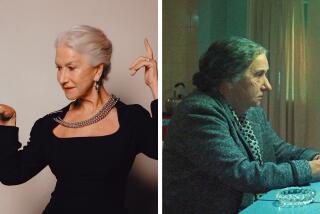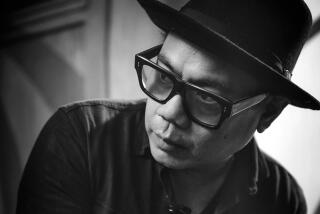TV REVIEW : ‘Gary Cooper’ Details Life, Legends of Actor
- Share via
Gary Cooper, the blue-eyed cowboy from Helena, Mont., was without question the most beautiful of all the great American actors, the most genuinely modest and one of the most unselfconsciously graceful. Like Henry Fonda, he became the perfect image on whom we could project our feelings of what a right-thinking American should be: a man of few but telling words, of unquestioned integrity and deep-rooted values.
If you doubt that, take a look at “Gary Cooper: American Life, American Legend” (Sunday at 7 p.m. on TNT cable), a powerful and nostalgic summing-up of the Cooper life and emerging myth.
Unlike recent film biographies (John Huston, George Stephens or William Wyler), this one has no interviews with cronies or co-stars to give it supporting ballast or insider insights. Instead, author and critic Richard Schickel has created a narrative, entrusted it to Clint Eastwood--not a bad choice to comment on another laconic American legend--and picked the film clips that most closely support Schickel’s own theories.
The results may be a bit skewed, because they slight most of Cooper’s urbane or sophisticated characters and much of his deft light comedy in favor of his Capra-Everymen and his Westerners, Virginians or Plainsmen. Nevertheless, it’s a literate, compulsively watchable hour.
Unfortunately, an hourlong program with breaks for commercials isn’t long enough to explore how Cooper, the consummate screen actor, learned how to use the camera so potently, or from whom.
Yet for a biography whose consultant was the star’s only child, Maria Cooper Janis, this film is relatively frank about the affair that created the greatest upheaval in the actor’s life: his romantic involvement at the age of 47 with his co-star in “The Fountainhead,” 22-year old Patricia Neal. Their 2-year affair, during which he left his family, is introduced as the moral conflict of Cooper’s life, although to understand anything about emotions on either side, you’d have to turn to other biographies or autobiographies. Clips from “The Fountainhead” aren’t quite enough.
Schickel finds in Cooper’s last, restorative films--”High Noon,” “Friendly Persuasion,” “They Came to Cordura,” et al.--a man returned to his best self, as well as to his family at the end of the Neal affair.
Presumably “High Noon” and “Cooper’s public defense of the writer when he was attacked by witch hunters” washes away the image of Cooper’s disingenuous performance as a friendly witness before the House Un-American Activities Committee. Certainly, it is more healing to close, as the biography does, with the Cooper of Frank Capra and with a final legacy of images of the shiningly handsome, quintessentially American young man, at a time in which everything seemed to lie before him, and us, “so various, so beautiful, so new.”
More to Read
The complete guide to home viewing
Get Screen Gab for everything about the TV shows and streaming movies everyone’s talking about.
You may occasionally receive promotional content from the Los Angeles Times.






